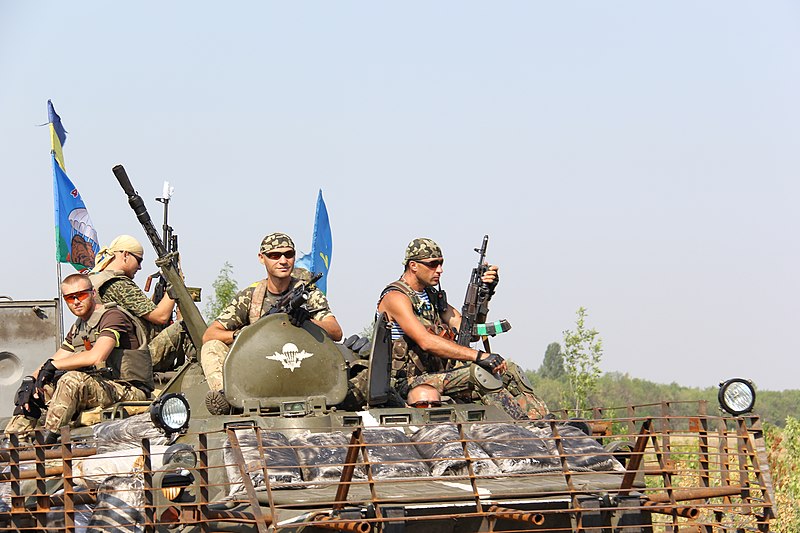
Several Russia watchers – Patrick Armstrong, Andrei Martyanov and Andrei Raevsky – are musing about a renewed attack by the government of Ukraine on its eastern Donbass region. The Donbass separated in 2014 after the U.S. driven coup in Kiev installed an anti-Russian government which then waged a war on its ethnic Russian east.
There have been a number of reports about heavy Ukrainian equipment moving east and other hints of military preparations. Russia has seen enough such signs to issue a strong warning:
“I would like to warn the Kiev regime and the hotheads that are serving it or manipulating it against further de-escalation and attempts to implement a forceful scenario in Donbass,” [Russian Foreign Ministry Spokeswoman Maria Zakharova] said, commenting on the statement of head of the Ukrainian delegation to the Contact Group for settlement in Donbass Leonid Kravchuk on some “radical steps” of Kiev if Russia refuses to recognize itself as a conflict side in eastern Ukraine.
…
Zakharova recalled that the Minsk Agreements clearly outline the conflict sides in Donbass as Kiev, Donetsk and Lugansk. “The unwillingness of Ukrainian negotiators to recognize this fact and their refusal to find agreements with Donbass is the reason that hinders the establishment of long-lasting peace in the region,” the diplomat noted.
The main catalyst for such a war is the sorry state of the government in Kiev. The country is in in the midst of a constitutional crisis:
[T]he Constitutional Court of Ukraine (CCU) recently plunged the country into one of its deepest crises in its 30-year history. Specifically, on October 27, 2020, the Court declared that the main elements of Ukraine’s anti-corruption legislation, adopted between 2014 and 2020, were unconstitutional. In response, President Zelensky introduced legislation calling for the early termination of all Constitutional Court judges. Later, in December, he suspended the chairman of the Court for two months.
The result was widespread chaos in Ukraine’s political system. Zelensky’s actions were of questionable legality and provoked harsh criticism from all political sides. The ramifications of the Court’s decision include the cancellation of over 100 pending corruption investigations, a development that potentially could endanger future EU-Ukraine trade and economic cooperation Ukraine under the 2014 Association Agreement.
After the 2014 Euromaidan coup an ‘independent’ National Anti-Corruption Bureau (NABU) was created to oversee the investigation and prosecution of corrupt state officials. The NABU has since been used by the U.S. embassy to bring criminal cases against those oligarchs it dislikes and to cover for those it likes. The constitutional court found that NABU is a criminal investigation agency outside the control of the executive branch which is a contradiction to the Ukrainian constitution.
The crisis has since escalated:
President Zelensky has now taken several provocative steps, including proposing legislation that voids the Constitutional Court’s anti-corruption rulings and begins the process of dismissing and replacing those justices who supported that decision. None of these actions are supported under present-day Ukrainian law. The rhetoric between the president and the Constitutional Court is also escalating, with Constitutional Court Chairman Tupitskyi warning that the president’s actions threaten the territorial integrity of Ukraine. Calls for impeachment proceedings are being raised in the Rada, and Zelensky yet again escalated the crisis on February 3, 2021 by blocking pro-Russian TV channels controlled by Victor Medvedchuk. The legality of the latter action was even questioned by the EU, who told Zelensky that while Ukraine possessed the right to protect itself from disinformation, it still had to comply with international standards and “fundamental rights and freedoms.”
The pressure on Zelensky is growing as he tries to navigate the fine line of obeying the law as written while simultaneously claiming that the very integrity of the country is at stake. And Zelensky’s problems are only mounting, with the Cabinet of Ministers recently calling for the dismissal of the head of NABU and the IMF delaying the next tranche of financial support, in part because of Ukraine’s failure to implement a comprehensive anti-corruption program.
Polling numbers for Zelensky have sharply declined. Right wing city councils call on Zelensky to outlaw the largest opposition party. Meanwhile the pandemic puts a record number of people into hospitals while a meager vaccination campaign is failing.
A war against the eastern separatist could be a Hail Mary attempt by Zelensky to regain some national and international support.
But nothing will happen on the frontline without the consent or even encouragement from Washington DC. The Biden administration is filled with the same delusional people who managed the 2014 coup in Kiev. They may believe that the NATO training the Ukrainian army received and the weapons the U.S. delivered are sufficient to defeat the separatist. But the state of the Ukrainian military is worse than one might think and the separatist will have Russia’s full backing. There is no question who would win in such a fight.
As a commentator at Turcopolier remarked:
If the US is not careful it is going to give the Russians another opportunity to show to the World their military prowess, the flexibility of their Military District system allowing multi front operation and their unfailing support for an ally. As well as potentially letting the Russians show to Europe that they have nothing to fear, if they stop at 30 miles or so and basically go back home. All whilst the US demonstrates the opposite, but then reinforcing DC may trump the World.
 RSS Feed
RSS Feed















 March 14th, 2021
March 14th, 2021  Awake Goy
Awake Goy  Posted in
Posted in  Tags:
Tags: 













